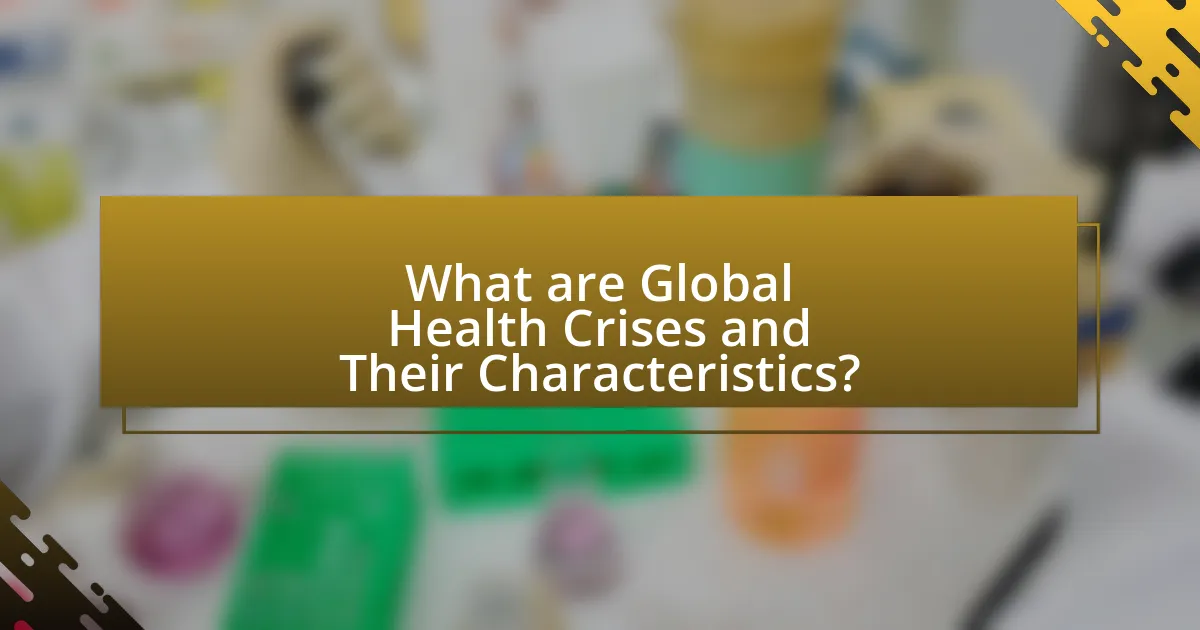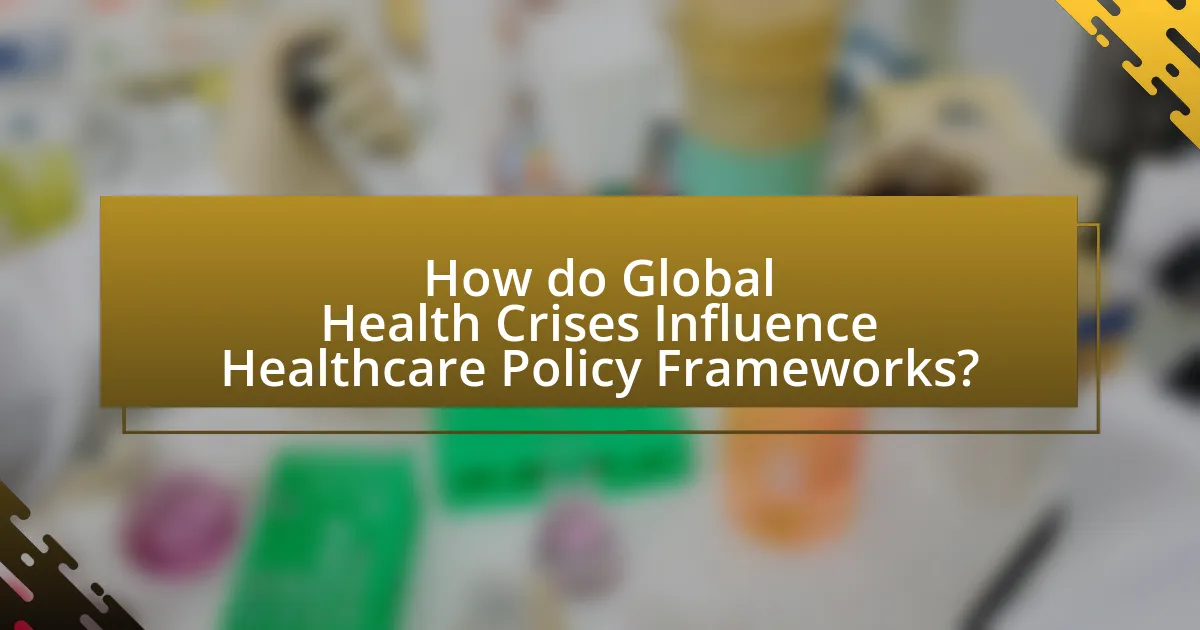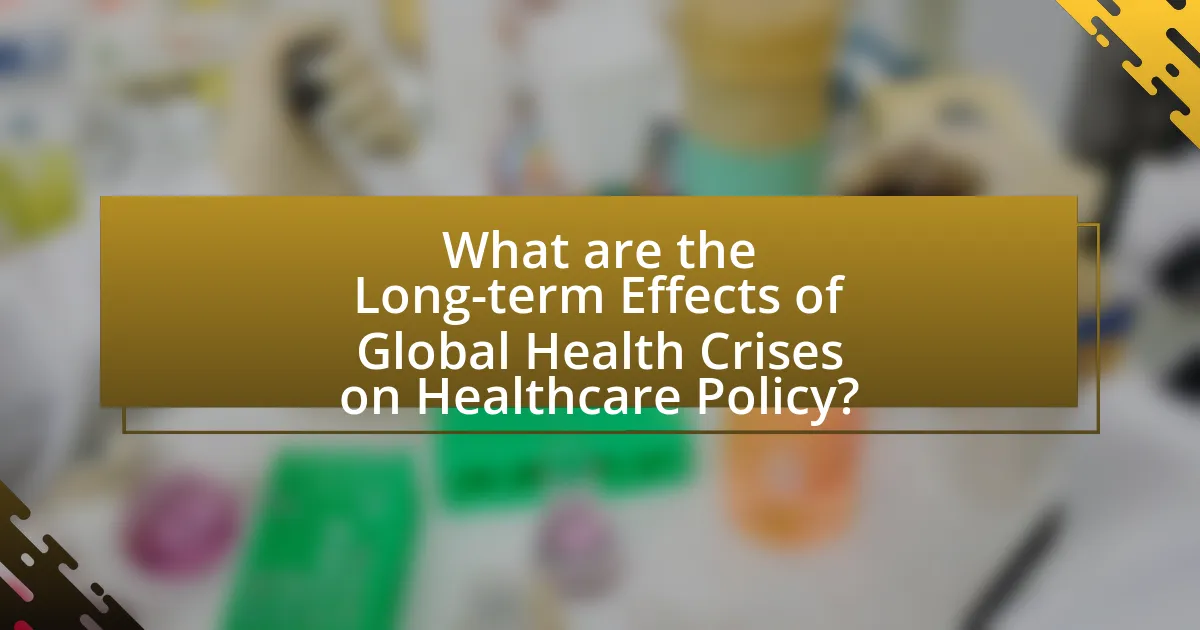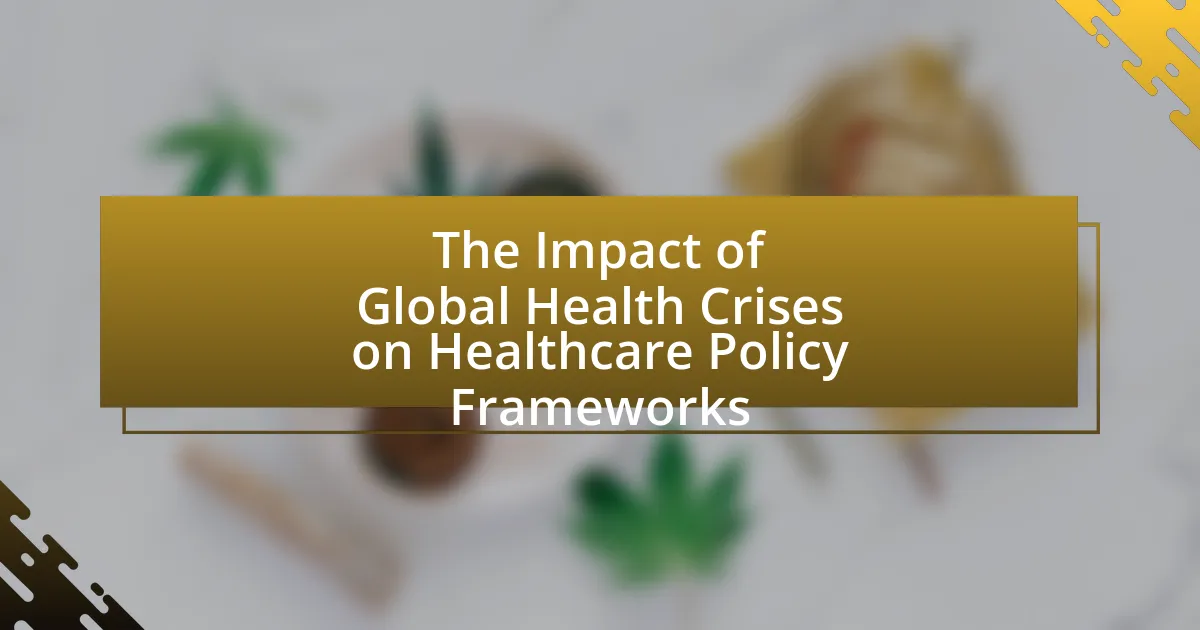Global health crises, such as pandemics and natural disasters, significantly impact healthcare policy frameworks by exposing vulnerabilities and necessitating rapid adaptations. This article examines the emergence of global health crises, their characteristics, and the factors contributing to their onset. It highlights the differences between global and local health emergencies, the implications for healthcare systems, and the long-term effects on policy, including increased investment in public health infrastructure and enhanced pandemic preparedness. Additionally, the article discusses the role of international organizations, stakeholder engagement, and data-driven decision-making in shaping effective healthcare policies during and after crises.

What are Global Health Crises and Their Characteristics?
Global health crises are significant health events that transcend national borders, affecting populations on a large scale and often overwhelming healthcare systems. These crises typically arise from pandemics, epidemics, natural disasters, or bioterrorism, characterized by rapid transmission of diseases, high morbidity and mortality rates, and substantial economic and social disruption. For instance, the COVID-19 pandemic, which began in late 2019, exemplifies a global health crisis, leading to millions of deaths worldwide and prompting widespread changes in healthcare policies and practices. Such crises necessitate coordinated international responses, highlighting the importance of global health governance and preparedness strategies.
How do global health crises emerge?
Global health crises emerge primarily through the intersection of infectious disease outbreaks, environmental changes, and socio-economic factors. For instance, the COVID-19 pandemic originated from a novel coronavirus, highlighting how zoonotic diseases can spill over into human populations due to increased human-animal interactions and global travel. Additionally, factors such as urbanization, climate change, and inadequate healthcare infrastructure exacerbate vulnerabilities, leading to rapid disease transmission. Historical examples include the 1918 influenza pandemic, which spread globally due to troop movements during World War I, demonstrating how interconnectedness can facilitate the emergence of health crises.
What factors contribute to the onset of global health crises?
The onset of global health crises is primarily influenced by factors such as infectious disease outbreaks, environmental changes, and socio-economic conditions. Infectious diseases, like the COVID-19 pandemic, can spread rapidly across borders due to globalization and urbanization, as evidenced by the World Health Organization’s reports on transmission patterns. Environmental changes, including climate change and deforestation, contribute to the emergence of zoonotic diseases, which account for over 60% of infectious diseases in humans, according to the Centers for Disease Control and Prevention. Additionally, socio-economic factors, such as poverty and inadequate healthcare infrastructure, exacerbate vulnerabilities, making populations more susceptible to health crises, as highlighted in studies by the World Bank.
How do global health crises differ from local health emergencies?
Global health crises differ from local health emergencies primarily in their scale and impact. Global health crises, such as pandemics, affect multiple countries and require international cooperation for response, as seen during the COVID-19 pandemic, which led to widespread travel restrictions and global vaccination efforts. In contrast, local health emergencies, like a regional outbreak of a disease, are confined to specific areas and typically managed by local health authorities without the need for extensive international collaboration. The World Health Organization reported that global health crises can strain resources across nations, while local emergencies often utilize existing local healthcare infrastructure and resources.
Why are global health crises significant for healthcare systems?
Global health crises are significant for healthcare systems because they expose vulnerabilities and stress the capacity of these systems to respond effectively. During events such as pandemics, healthcare systems face increased demand for services, which can lead to resource shortages, overwhelmed facilities, and strained personnel. For instance, the COVID-19 pandemic resulted in a 50% increase in hospitalizations in many regions, highlighting the need for robust emergency preparedness and response strategies. This situation necessitates reevaluation and adaptation of healthcare policies to enhance resilience, improve access to care, and ensure equitable distribution of resources, ultimately shaping the future of healthcare frameworks.
What impact do global health crises have on public health outcomes?
Global health crises significantly deteriorate public health outcomes by overwhelming healthcare systems, increasing morbidity and mortality rates, and exacerbating health disparities. For instance, during the COVID-19 pandemic, the World Health Organization reported that many countries experienced a surge in non-communicable diseases due to disrupted healthcare services, leading to an estimated 1.5 million additional deaths from conditions like diabetes and hypertension. Furthermore, global health crises often divert resources away from routine healthcare, resulting in delayed treatments and preventive care, which can lead to long-term negative health consequences for populations.
How do global health crises affect healthcare resource allocation?
Global health crises significantly disrupt healthcare resource allocation by diverting funds and personnel from routine healthcare services to emergency response efforts. For instance, during the COVID-19 pandemic, many countries reallocated healthcare budgets to prioritize pandemic response, resulting in reduced funding for non-urgent medical services, such as elective surgeries and preventive care. This shift in resource allocation can lead to long-term consequences, including increased morbidity and mortality from untreated conditions, as evidenced by a 2021 study published in The Lancet, which reported a 50% decline in cancer screenings in the U.S. during the early months of the pandemic. Thus, global health crises necessitate a re-evaluation of resource distribution, often at the expense of ongoing healthcare needs.

How do Global Health Crises Influence Healthcare Policy Frameworks?
Global health crises significantly influence healthcare policy frameworks by prompting rapid adaptations and reforms to address emerging challenges. For instance, during the COVID-19 pandemic, countries worldwide implemented policies to enhance healthcare infrastructure, prioritize public health funding, and improve emergency response systems. The World Health Organization reported that nations increased investments in healthcare technology and telemedicine, reflecting a shift towards more resilient healthcare systems. Additionally, global health crises often lead to the establishment of new regulatory frameworks aimed at improving disease surveillance and response capabilities, as seen with the International Health Regulations updates following the Ebola outbreak. These changes demonstrate how crises catalyze policy evolution to better prepare for future health emergencies.
What changes in healthcare policy are prompted by global health crises?
Global health crises prompt significant changes in healthcare policy, primarily aimed at enhancing preparedness and response mechanisms. For instance, the COVID-19 pandemic led to the implementation of policies that prioritize rapid vaccine development and distribution, as evidenced by the Emergency Use Authorization process established by the FDA, which allowed for expedited approval of vaccines. Additionally, global health crises often result in increased funding for public health infrastructure, as seen in the U.S. with the allocation of billions in emergency funding through the CARES Act to bolster healthcare systems. These policy shifts are designed to improve resilience against future health emergencies and ensure a more coordinated response across various sectors.
How do governments adapt their healthcare policies in response to crises?
Governments adapt their healthcare policies in response to crises by implementing rapid changes to regulations, funding, and resource allocation. For instance, during the COVID-19 pandemic, many governments expanded telehealth services to ensure continued access to care while minimizing virus transmission. Additionally, they reallocated budgets to prioritize emergency response efforts, such as vaccine development and distribution, as seen in the United States with the allocation of billions in funding through the CARES Act. These adaptations are often guided by real-time data and public health recommendations, allowing for a flexible response to evolving situations.
What role do international organizations play in shaping healthcare policies during crises?
International organizations play a crucial role in shaping healthcare policies during crises by providing guidance, resources, and coordination among countries. For instance, the World Health Organization (WHO) establishes international health regulations and offers technical assistance to nations, which helps standardize responses to health emergencies. During the COVID-19 pandemic, WHO issued guidelines that influenced national policies on testing, vaccination, and public health measures, demonstrating its impact on global healthcare strategies. Additionally, organizations like Médecins Sans Frontières and the United Nations Children’s Fund (UNICEF) mobilize resources and expertise to address urgent health needs, further shaping policy frameworks in crisis situations.
Why is it important to analyze the impact of global health crises on healthcare policy?
Analyzing the impact of global health crises on healthcare policy is crucial because it informs the development and adaptation of effective health strategies. Understanding how crises like pandemics influence healthcare systems allows policymakers to identify weaknesses, allocate resources efficiently, and implement preventive measures. For instance, the COVID-19 pandemic highlighted gaps in public health infrastructure, leading to increased funding for emergency preparedness and telehealth services. This analysis is supported by data from the World Health Organization, which emphasizes the need for resilient healthcare systems that can respond to future health emergencies effectively.
What lessons can be learned from past global health crises regarding policy effectiveness?
Past global health crises reveal that timely and transparent communication is crucial for effective policy implementation. For instance, during the 2003 SARS outbreak, countries that quickly shared information and coordinated responses, like Canada and Singapore, managed to contain the virus more effectively than those that delayed action. Additionally, the COVID-19 pandemic highlighted the importance of flexible healthcare systems that can adapt to sudden demands, as seen in countries with robust telehealth services that maintained care continuity. Furthermore, equitable access to healthcare resources emerged as a vital lesson; nations that prioritized vulnerable populations, such as during the Ebola outbreak in West Africa, demonstrated better overall health outcomes. These examples underscore that effective policies must be proactive, inclusive, and adaptable to respond to emerging health threats.
How can future healthcare policies be improved based on these lessons?
Future healthcare policies can be improved by integrating lessons learned from past global health crises, such as the COVID-19 pandemic. These lessons highlight the necessity for robust emergency preparedness plans, which should include stockpiling essential medical supplies and establishing rapid response teams. For instance, the World Health Organization reported that countries with pre-existing pandemic preparedness frameworks were able to respond more effectively, reducing morbidity and mortality rates. Additionally, policies should emphasize the importance of data sharing and collaboration among nations, as evidenced by the success of countries that utilized real-time data to track and manage outbreaks. Implementing these strategies can enhance resilience and adaptability in healthcare systems, ultimately leading to better health outcomes during future crises.

What are the Long-term Effects of Global Health Crises on Healthcare Policy?
Long-term effects of global health crises on healthcare policy include increased investment in public health infrastructure, enhanced focus on pandemic preparedness, and greater emphasis on health equity. For instance, the COVID-19 pandemic prompted many countries to allocate more resources to healthcare systems, with the World Health Organization reporting a 20% increase in health spending in several nations. Additionally, global health crises often lead to the establishment of new policies aimed at improving surveillance and response mechanisms, as seen with the implementation of the International Health Regulations following the SARS outbreak. These changes reflect a shift towards prioritizing resilience in healthcare systems to better manage future health emergencies.
How do global health crises lead to permanent changes in healthcare policy frameworks?
Global health crises lead to permanent changes in healthcare policy frameworks by exposing systemic weaknesses and prompting immediate governmental and institutional responses. For instance, the COVID-19 pandemic highlighted gaps in pandemic preparedness, resulting in countries like Germany and South Korea implementing robust surveillance systems and rapid response protocols. Historical evidence shows that the 2003 SARS outbreak led to the establishment of the Global Health Security Agenda, which aimed to enhance global health security and improve response capabilities. These crises catalyze policy reforms that prioritize public health infrastructure, funding, and inter-agency collaboration, ensuring that lessons learned translate into lasting changes in healthcare governance.
What specific policies have been reformed as a result of recent global health crises?
Recent global health crises have led to significant reforms in public health policies, particularly in areas such as pandemic preparedness, vaccine distribution, and telehealth regulations. For instance, the COVID-19 pandemic prompted many countries to enhance their pandemic response frameworks, including the establishment of rapid response teams and improved surveillance systems to detect outbreaks early. Additionally, vaccine distribution policies were reformed to prioritize equitable access, as seen in initiatives like COVAX, which aims to ensure vaccines reach low- and middle-income countries. Furthermore, telehealth regulations were relaxed to facilitate remote consultations, allowing healthcare providers to deliver services more efficiently during lockdowns. These reforms reflect a shift towards more resilient healthcare systems capable of responding to future health emergencies.
How do these changes impact healthcare delivery and access?
Changes in healthcare policy frameworks due to global health crises significantly impact healthcare delivery and access by prioritizing rapid response mechanisms and resource allocation. For instance, during the COVID-19 pandemic, many countries implemented telehealth services to maintain patient care while minimizing virus transmission, which increased access for patients in remote areas. Additionally, the allocation of funding towards public health initiatives and vaccine distribution has been accelerated, as seen in the U.S. where the CARES Act provided over $2 trillion to support healthcare systems. These adaptations demonstrate a shift towards more flexible and responsive healthcare delivery models, ultimately enhancing access to essential services during crises.
What challenges do policymakers face in adapting to the lessons learned from global health crises?
Policymakers face significant challenges in adapting to lessons learned from global health crises, primarily due to the complexity of integrating new knowledge into existing frameworks. One major challenge is the need for rapid response mechanisms that can be effectively implemented during crises, as evidenced by the delays experienced during the COVID-19 pandemic, which highlighted gaps in preparedness and coordination among health agencies. Additionally, policymakers often struggle with balancing public health priorities against economic and political pressures, which can hinder the adoption of evidence-based practices. For instance, the reluctance to impose strict public health measures during outbreaks can stem from concerns about economic repercussions, as seen in various countries during the early stages of the pandemic. Furthermore, the challenge of ensuring equitable access to healthcare resources and addressing disparities in health outcomes complicates the adaptation process, as seen in the disproportionate impact of health crises on marginalized communities. These factors collectively impede the effective incorporation of lessons learned into sustainable healthcare policies.
How do political, economic, and social factors influence policy adaptation?
Political, economic, and social factors significantly influence policy adaptation by shaping the priorities and responses of governments during global health crises. Political factors, such as government stability and public trust, determine the effectiveness of policy implementation; for instance, countries with strong leadership often adapt policies more swiftly in response to health emergencies. Economic factors, including resource availability and financial constraints, dictate the feasibility of policy changes; during the COVID-19 pandemic, nations with robust economies were able to invest in healthcare infrastructure and vaccine distribution, while those with weaker economies struggled. Social factors, such as public behavior and cultural attitudes towards health, also play a crucial role; communities that prioritize health and safety are more likely to comply with new policies, as seen in countries where mask mandates were widely accepted. Together, these factors create a complex environment that influences how policies are adapted to address the challenges posed by global health crises.
What strategies can be employed to overcome these challenges?
To overcome the challenges posed by global health crises on healthcare policy frameworks, governments can implement adaptive policy-making strategies. These strategies include enhancing data collection and analysis to inform decision-making, fostering collaboration among public health agencies and private sectors, and prioritizing flexible funding mechanisms that can be quickly mobilized in response to emerging health threats. For instance, the COVID-19 pandemic highlighted the need for real-time data sharing and inter-agency cooperation, which proved essential in managing the crisis effectively. Additionally, countries that established emergency response funds were able to allocate resources swiftly, demonstrating the importance of financial preparedness in addressing health emergencies.
What best practices can be implemented to enhance healthcare policy resilience?
To enhance healthcare policy resilience, implementing adaptive governance structures is essential. Adaptive governance allows for flexibility and responsiveness to changing health crises, enabling policymakers to adjust strategies based on real-time data and emerging evidence. For instance, during the COVID-19 pandemic, countries that utilized adaptive governance frameworks, such as New Zealand and South Korea, demonstrated quicker responses and better health outcomes by rapidly adjusting policies based on infection rates and healthcare capacity. This approach is supported by research from the World Health Organization, which emphasizes the importance of agility in health systems to withstand shocks and maintain service delivery.
How can stakeholder engagement improve policy responses to health crises?
Stakeholder engagement can significantly enhance policy responses to health crises by ensuring that diverse perspectives and expertise are integrated into decision-making processes. Engaging stakeholders, such as healthcare professionals, community leaders, and affected populations, allows policymakers to identify specific needs, challenges, and effective solutions tailored to the crisis at hand. For instance, during the COVID-19 pandemic, stakeholder engagement facilitated the rapid dissemination of information and resources, leading to more effective public health interventions. Research published in the journal “Health Policy” highlights that inclusive stakeholder participation leads to improved trust and compliance with health measures, ultimately resulting in better health outcomes.
What role does data and research play in shaping effective healthcare policies?
Data and research are critical in shaping effective healthcare policies by providing evidence-based insights that inform decision-making. These insights help policymakers identify health trends, assess the effectiveness of interventions, and allocate resources efficiently. For instance, during the COVID-19 pandemic, data on infection rates and vaccine efficacy guided public health responses and policy adjustments, demonstrating the importance of real-time research in crisis management. Furthermore, studies such as the “Global Burden of Disease Study” published in The Lancet highlight how comprehensive data collection can reveal health disparities and inform targeted policy initiatives, ensuring that healthcare systems address the needs of diverse populations effectively.

Leave a Reply